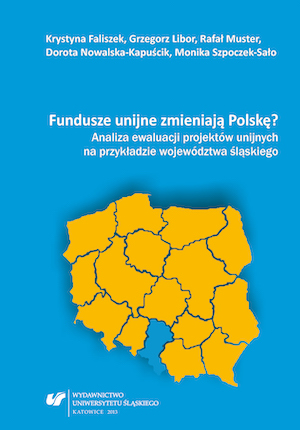Fundusze unijne zmieniają Polskę? Analiza ewaluacji projektów unijnych na przykładzie województwa śląskiego
Do European funds change Poland? The analysis of the evaluation of European projects on the example of the Silesian voivodship
Author(s): Krystyna Faliszek, Grzegorz Libor, Rafał Muster, Dorota Nowalska-Kapuścik, Monika Szpoczek‑Sało
Subject(s): Politics, Social Sciences, Sociology, EU-Accession / EU-DEvelopment
Published by: Wydawnictwo Uniwersytetu Śląskiego
Keywords: European funds; Silesian voivodship
Summary/Abstract: The volume mainly concentrates on presenting the issues connected with conductingevaluative studies from the practical point of view. The focus is, among other things,on practical aspects of the realization of evaluative studies of the projects financed fromthe European resources in the Silesian voivodship. The authors of the volume wanted toshow the issues concerning the realization of studies aiming at a diagnosis of the effectsof the external interference undertaken within the frame of the projects realized in theSilesian voivodship.The studies, the results of which, encouraged us to present this publication wereconducted in a qualitative way, by means of a questionnaire containing dispositions toquestions in over ninety districts and counties of the Silesian voivodship. Thanks to it,the material gathered also allowed for some basic quantitative analyses. The questionnairegivers, the role of which was performed by our students, asked the representativesof self‑governmentinstitutions in districts and counties, responsible for the realizationof European projects in a given unit, to make information on not only the projects assuch, but above all their evaluation available. The initial questionnaire questions concernedthe project itself and its classification as regards the programme (“Human Capital”Operational Programme, Regional Operational Programme of the Silesian Voivodship,as well as a priority, action or sub‑action).The next questions concerned ways ofevaluating the project. Here the questions asked for a definition of evaluation used for thepurposes of its realization, the subjects taking part in the evaluative study, the criteria ofselecting the evaluators, aims of the evaluative study, the type of the study in terms of itssubject, aim, time, nature of evaluator, evaluative criteria, methods and techniques usedin the study, the final report as well as its structure, and, last but not least, recommendationsderiving from the evaluative report. This way, an interesting study material wasgathered, the analysis of which allowed for making a few conclusions worth presenting.The first chapter of the volume presents basic information on the usage of Europeanresources in Poland, putting an emphasis on the Silesian Voivodship. A lot of attentionwas paid to the Regional Operational Programme of the Silesian Voivodship, within thescope of which the broadest stream of European funds comes to the regions. The secondchapter, apart from raising strictly methodological issues and problems directly resultingfrom the study realization, presents a characteristic of different elements of the evaluationssuch as types of evaluations, their aims, functions, criteria and final reports, aswell as how the evaluation is really perceived, and what role it is ascribed. In the thirdchapter, on the other hand, three selected examples of the so called good evaluativepractices, namely evaluative studies that can be considered as model and worth imitatingwere described. These were the evaluations of the following projects: „Droga doprzyszłości szkół w Przystajni”, „Szansa dla Ciebie”, and „Skorzystaj z szansy”. The bookcloses with a chapter devoted to the Generator of the Application Forms of the „HumanCapital” Operational Programme, that is a programme that serves the application forEuropean resources and their obtainment.We would like our publication to become useful both for the students already startingto deepen their knowledge on evaluative studies, and practitioners who, realizingvarious programmes and projects financed (or co‑financed)by the European resources,have to know how or prepare and conduct the evaluative studies or evaluate if the evaluationconducted by external experts was realized according to the principles of researchreliability.
- E-ISBN-13: 978-83-8012-245-1
- Print-ISBN-13: 978-83-226-2243-8
- Page Count: 154
- Publication Year: 2013
- Language: Polish
- eBook-PDF
- Table of Content
- Introduction

